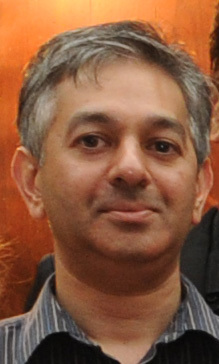Dr Lester Ryan John: 1968–2018
22 September 2018
It is with much sadness that we announce the sudden passing of Dr Lester Ryan John, a former senior lecturer in the University of Cape Town’s (UCT) Department of Human Biology, on 22 September 2018.
Lester, who died of a heart attack at his Pinelands home, aged 49, was employed at UCT from 2002 to 2015. An alumnus who obtained his Doctorate in Biomedical Engineering, he previously completed his bachelor’s degree in Electronics Engineering at the then University of Natal in Durban.
He was first appointed as electronics engineer in the UCT/Medical Research Council medical imaging unit, then later promoted to senior lecturer. His research centred on electrophysiology and Lester also successfully supervised several PhD and MSc students.
Prior to this appointment at UCT, he had spent several years in the software development industry and had consulted for Intel and IBM.
Lester’s achievements include establishing a dedicated electroencephalography (EEG) recording laboratory in the Division of Biomedical Engineering, including fundraising for the state-of-the art EEG system. He was also instrumental in establishing a musculoskeletal biomechanics laboratory in Department of Human Biology’s Exercise Science and Sports Medicine division, located at the Sports Science Institute of South Africa.
His research led to several patents and high-quality postgraduate dissertations. He is also well-known for his invention of a non-invasive deep muscle EMG system (dEMG), which was patented in several countries, and was the founder of a MedTech start-up company Elemedic, through which he commercialised his dEMG technology.
Elemedic also specialised in electronic medical and physiological devices.
Lester was integral to the MSc programme in Biomedical Engineering. He established and lectured a postgraduate course in applied electrophysiology and co-developed the postgraduate course Medical Device Design.
Apart from his own research programme, Lester contributed his expertise to collaborative research involving many colleagues in the department and in the faculty. He also consulted extensively.
Lester is survived by his wife Sheron, his mother May and his siblings Lynelle and Anslyn.
He will be remembered for his unique expertise in the field of EEG and brain-computer interface, and more recently in surface electromyography. He will be sorely missed by his colleagues and students.
We extend our deepest condolences to his wife, mother, friends and colleagues, and wish them much strength in the days ahead.
 This work is licensed under a Creative Commons Attribution-NoDerivatives 4.0 International License.
This work is licensed under a Creative Commons Attribution-NoDerivatives 4.0 International License.
Please view the republishing articles page for more information.








